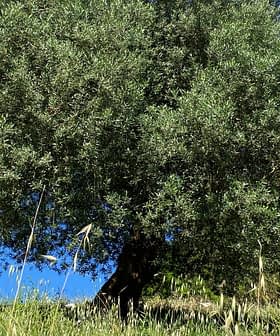Phenolic Compound in EVOO May Be Beneficial for Parkinson's Disease
A new study found that tyrosol delayed neurodegeneration and contributed to a longer lifespan in worms by reducing oxidative stress and inducing the expression of different protective genes.
A new study published in Neurobiology of Aging suggests that tyrosol, a phenolic compound found in extra virgin olive oil, could have the potential to become a nutraceutical compound for Parkinson’s disease; bringing hope of a new treatment to the estimated 10 million worldwide sufferers of the progressive neurological condition.
The pioneering study, which was carried out by researchers from the University of Jaén and the Bellvitge Institute for Biomedical Research, examined the effects of tyrosol on Caenorhabditis elegans worms with various forms of Parkinsonism.
The research team discovered that worms treated with tyrosol enjoyed a significantly longer lifespan of around 21.33 days compared to untreated worms whose average lifespan was just 18.67 days.
See Also:Olive Oil Health BenefitsThe researchers concluded that tyrosol delayed neurodegeneration in worms and reduced oxidative stress. It also appeared to induce the expression of different protective genes in a particular form of Parkinsonism.
It was also noted that worms treated with tyrosol benefited from 80 percent of dopaminergic neurons being intact at two weeks of age compared to just 45.33 percent in untreated ones. This was an important finding as the loss of these neurons is a trademark of Parkinson’s disease.
The tyrosol treatment was also noted to significantly reduce the levels of molecules associated with damaging DNA and cellular structures. While untreated worms averaged 124.5 of these molecules, the tyrosol treated creatures had a much lower average of around 12.06. These figures suggested that the tyrosol treatment had been effective in reducing neurodegeneration.
The overall results suggested that the tyrosol treatment had had an effective antioxidant effect on the study’s worms with the treatment significantly increasing the expression of some proteins; including heat shock proteins which are known to assist cells in protecting themselves from damage.
The tyrosol treatment also substantially reduced the number of clumps of the alpha protein synuclein (an indicator of Parkinson’s disease) to 22.63 per worm in treated creatures compared to 58.72 per worm in untreated ones.
While it was noted that the treated worms ability to move independently was significantly better on the ninth day of its life, at no other points in time was there a notable difference. It was also reported that both treated and untreated worms developed paralysis by the time they reached 11 days old.
In an earlier study by the same research team, it was discovered that tyrosol delayed aging, increased life spans and reduced markers of cellular stress in worms. This study inspired the team to investigate if the phenol could be beneficial to neurodegenerative conditions, particularly Parkinson’s disease.
In 2016, Olive Oil Times reported on a study which found that phenols found in extra virgin olive oil provided antioxidant and anti-inflammatory benefits to the brain and offered neuroprotective activity against diseases including Parkinson’s and Alzheimer’s.
The beneficial effects of extra virgin olive oil have been attributed to its high levels of antioxidants and monounsaturated fatty acids, with tyrosol, in particular, being acknowledged for its antioxidant properties.








